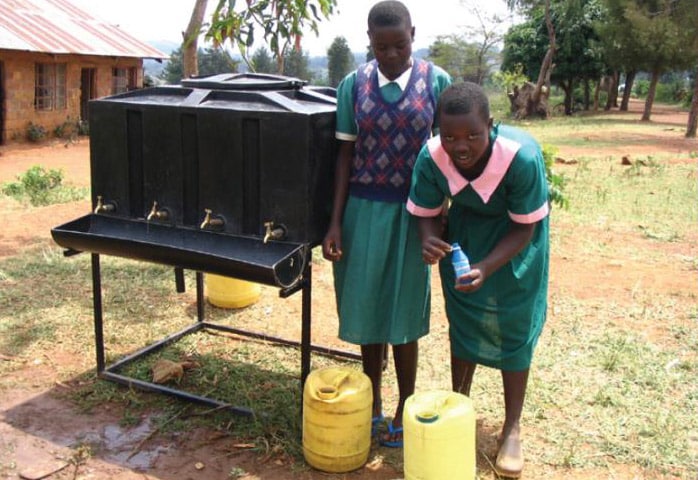Error processing SSI file
Error processing SSI file
Stories From the Field
Safe water school interventions in Kenya save lives

Two members of the safe water club at Sino SDA Primary School in Nyanza Province in rural Kenya treating the school drinking water with WaterGuard.
Over 1.1 billion people worldwide do not have access to safe drinking water. Nearly two million children die each year due to diarrhea and other infectious diseases resulting from unsafe drinking water, inadequate sanitation, and poor hygiene.
To prevent these deaths, CDC developed the Safe Water System (SWS), which includes a water treatment solution, vessels for safe water storage, and educational materials to improve household water handling and hygiene practices. SWS use has been proven to reduce diarrheal diseases by 22% to 84%. CDC works with USAID, Population Services International (PSI), and other partners to market the solution, and provides ongoing public health and engineering technical assistance for product development, program design, evaluation, and monitoring. A bottle of the water treatment solution, produced and marketed locally under brand names such as WaterGuard, costs 25 cents; this affordable option is enough for a family to treat all of its drinking water for 4 to 6 weeks. In 2007, over 12 million bottles of the solution were sold in 19 countries, enough to treat drinking water for 16.5 million people.
In Kenya, 12.5 million people do not have access to an improved drinking water source, and only 33% of children younger than 5 years old receive adequate treatment for diarrhea. In May 2005, CARE Kenya, CDC, and Emory University implemented a school-based in-tervention in 45 rural primary schools in western Kenya. Each school received portable hand washing stations, water storage containers, and several months' supply of WaterGuard solution and soap for hand washing. Teachers were trained to organize student-run Safe Water clubs and to teach students to promote hand washing. An evaluation demonstrated a marked reduction in student absenteeism; improvements in students' knowledge of correct water treatment and hand washing procedures; and transfer of students' knowledge and practices to their families. Funding for the pilot project, evaluation efforts, and an expansion of the program to 500 schools was provided by the Coca-Cola Africa Foundation, USAID, and the Gates Foundation.
Linking local community education with existing health-beneficial products can leverage funding to reach hundreds of thousands of students and their families. CDC is helping to provide access to safe drinking water and improved hygiene in 25 additional countries through efforts like the Kenya program.
For the original story and more information, see CDC at Work [PDF - 1 page].
More Information
Error processing SSI file
Error processing SSI file
Error processing SSI file
Error processing SSI file